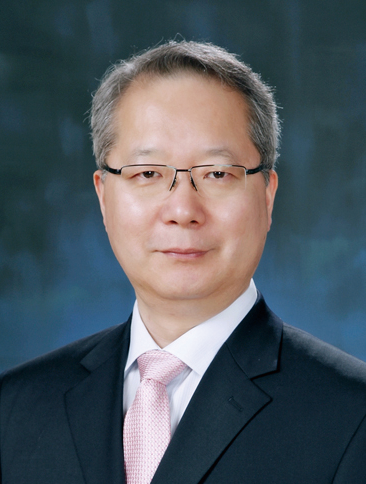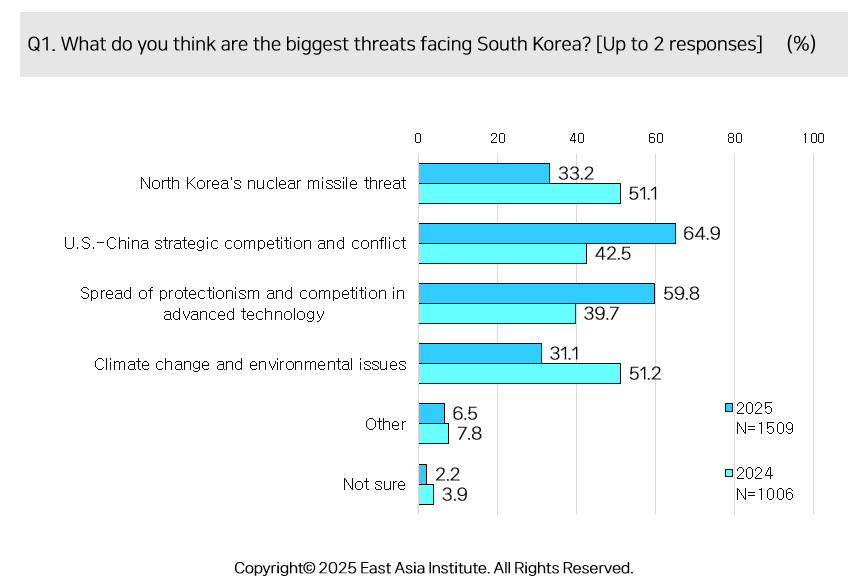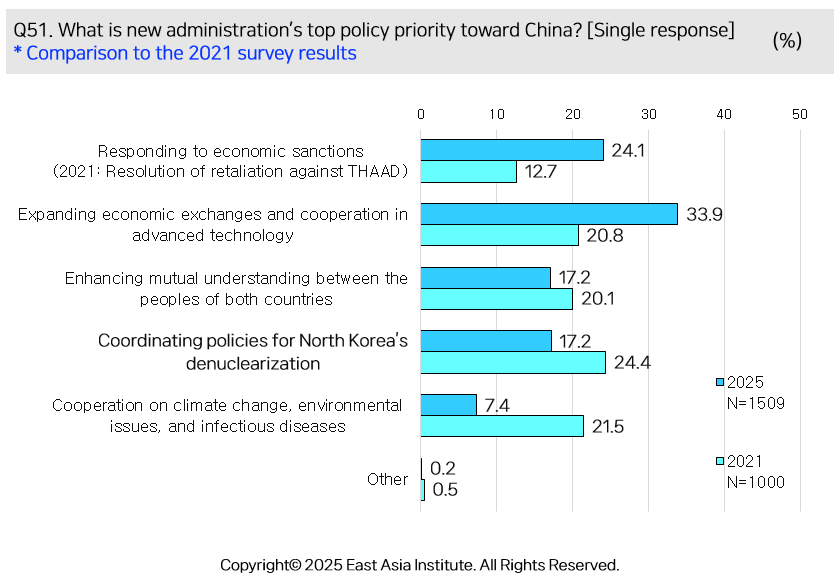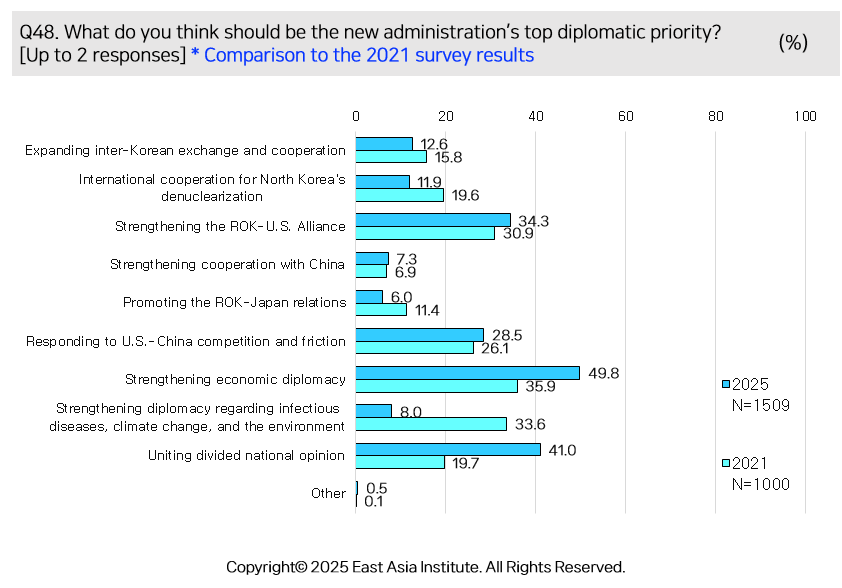Priorities of the Lee Jae Myung Administration’s Diplomacy with China
- Commentary
- June 30, 2025

- Dong Ryul LEE
- Chair of EAI’s China Research Center and Professor at Dongduk Women’s University

Dong Ryul Lee, Chair of EAI’s China Research Center and Professor at Dongduk Women's University, analyzes the priorities that the Lee Jae Myung administration should set in its China policy. Professor Lee suggests that the government restore strategic communication between South Korea and China and realistically readjust expectations of China's role in the North Korean nuclear issue. Additionally, the author argues that while restoring civilian exchanges, South Korea needs to adopt a prudent and phased approach to improve South Korea-China relations over the medium to long term.
■ See Korean Version on EAI Website
The brief phone conversation between the leaders of South Korea and China on June 10 not only signaled a shared political will to improve bilateral relations, but also clearly revealed the underlying challenges and difficulties between the two countries. Both governments harbor high expectations for better relations. However, since the THAAD dispute in 2016, ROK-China relations have stagnated at their lowest point, with both momentum and motivation for improvement significantly weakened. Contrary to public expectations, the mere inauguration of a new government does not necessarily guarantee improved relations. Realistically, the new administration must prioritize diplomacy and negotiations with the United States, while its China policy will inevitably be influenced by ROK-U.S. relations and face various challenges and uncertainties. ROK-China relations continue to be shaped by divergent strategic expectations and demands, making it difficult to identify areas of mutual cooperation.
I. Prudent Management of Sensitive Issues and Restoration of Strategic Communication
Even in the brief phone call between the two leaders, it was evident that the key issues each country emphasized and requested from the other were quite different. President Xi Jinping focused on two main points: first, the joint defense of multilateralism and free trade, as well as the stability of supply chains; and second, mutual respect for each other's core interests and major concerns. In essence, China is responding to U.S. tariff policies while using this as a platform to seek improved relations with South Korea. Through improving ties with South Korea, China hopes that the Lee Jae Myung administration will refrain from joining the U.S.-led anti-China coalitions as U.S.-China tensions escalate. In particular, China has reiterated that the Taiwan issue is a core national interest and has requested that South Korea refrain from involvement. Thus, China's strategic interest in South Korea and its motivation to improve bilateral ties are closely linked to its competition and confrontation with the United States. The Xi administration has openly expressed hope that the Lee government will depart from the previous administration, which focused on strengthening the ROK-U.S. alliance and promoting trilateral cooperation with Japan.
Meanwhile, the Trump administration is pressing its ally, South Korea, to participate more actively in efforts to counter China. The new government is faced with difficult and high-stakes negotiations with the U.S. on issues such as tariffs, advanced technologies, defense cost-sharing for U.S. troops in Korea, the transfer of wartime operational control, and the North Korean nuclear issue—all while being relatively unprepared. Moreover, public opinion may pressure the progressive government to actually strengthen the ROK-U.S. alliance, rather than weaken it. Despite its willingness to improve relations with China, the Lee administration faces a complex reality that makes it extremely difficult to meet Beijing’s expectations.
Nevertheless, according to the 13th East Asia Institute (EAI) Public Poll conducted on June 4–5, 2025, South Korean public opinion continues to place the highest priority on the ROK-U.S. relations. An overwhelming number of respondents support strengthening the ROK-U.S. alliance. In 2025, South Koreans perceive the strategic competition between the U.S. and China (64.9%) and the spread of protectionism and advanced technology rivalry (59.8%) as greater threats than North Korea’s nuclear and missile threats (33.2%, down 17.9 percentage points from 51.1% in 2024) (see Figure 1). In this context, 90.7% of respondents viewed the ROK-U.S. relations as the most important, an increase of 15.6 percentage points from 2024. Both progressive (91.2%) and conservative respondents (91.7%) expressed similar views. By contrast, only 43.2% considered the ROK-China relations important—less than half the figure for the ROK-U.S. relations.
Figure 1. Biggest Threats to South Korea

Amid deepening U.S.-China competition, a growing number of respondents believe that the ROK-U.S. alliance should evolve from addressing only the North Korean military threat to tackling regional and global challenges. Support for this view rose from 77.8% in 2024 to 86.3% in 2025. Additionally, 87.5% (up 8.2 percentage points from 2024) believe that tensions in the Taiwan Strait are crucial to South Korea’s national interest, reflecting a recognition that South Korea’s security is influenced by regional dynamics beyond the Korean Peninsula.
However, when asked how South Korea should respond in the event of a military conflict in the Taiwan Strait, the most favored responses were "provide only humanitarian assistance" (49.3%) and "do not get involved" (15.8%), up 5.1 and 6.7 percentage points from 2024, respectively. Regarding the role of U.S. forces in Korea during a Taiwan crisis, the top responses were that they should perform rear-area support duties from the Korean Peninsula (42.3%) or focus solely on defending South Korea (29.5%). While there is concern about the negative impact of Taiwan Strait tensions on Korea, there is also a clear consensus that South Korea should limit its involvement and focus on its own national security.
Given the dominant public view that the ROK-U.S. alliance is crucial and anti-China sentiment is high, it will be difficult for the new administration to prioritize or aggressively pursue better ties with China. In reality, the Lee administration will have no choice but to focus on managing negotiations and U.S.-origin risks early in its term, making it unlikely to pursue the kind of "balanced diplomacy" between the U.S. and China that China hopes for.
Therefore, rather than nurturing overly optimistic expectations for rapid improvement, the administration should prioritize managing China-related risks in its diplomacy. Both countries must exercise restraint on sensitive issues that could trigger conflict and establish mechanisms for prompt communication to prevent escalation. The administration also needs to consistently convey through various channels that its strengthened alliance with the U.S. is aimed at countering North Korean provocations, while gradually restoring a practical and functional relationship with China. Regarding the Taiwan issue, the government should echo public sentiment by avoiding direct involvement and adhering to the basic diplomatic position that South Korea will honor its original agreements with China. The situation should be carefully monitored and managed.
Furthermore, while the alliance with the U.S. remains constant, the administration should also leave room for possible cooperation with China on the principles of supporting multilateralism and free trade. It must retain room and leverage to respond to the Trump administration’s excessive tariff pressures. While strengthening cooperation with the U.S. and preparing for negotiations, the government ought to prepare for potential frictions with China and manage them to prevent escalation.
Looking back on the 33-year history of Korea-China relations, it is clear that whenever conflicts have intensified, official intergovernmental dialogue has been the first to be suspended and often proved difficult to resume, leaving a path toward conflict resolution elusive. To prevent such circumstances, it is essential to establish practical, supplementary dialogue channels that can be quickly restored in case of conflict. If multi-level dialogues across various sectors are regularized and institutionalized, they can broaden mutual understanding, prevent conflicts rooted in misperceptions, and improve the ability to anticipate policy shifts, helping avoid unexpected crises.
II. Realistic Recalibration of ‘China’s Role’ in the North Korean Nuclear Issue
President Lee Jae Myung, in the phone conversation of June 10, called for “China’s constructive role for denuclearization, peace, and stability of the Korean Peninsula.” President Xi Jinping responded that “peace and stability of the Korean Peninsula are common interests of both South Korea and China, and China will strive for the resolution of the issue and for peace and stability of the Korean Peninsula.” Albeit briefly, this correspondence underscored the long-standing divergence between the two nations’ views on the perennial North Korean challenge.
The substance of the Lee Jae Myung-Xi Jinping dialogue concerning the Korean Peninsula was conspicuously absent from the official statement issued by the Chinese Ministry of Foreign Affairs. According to a briefing by the South Korean Presidential Office spokesperson, President Lee explicitly invoked “denuclearization of the Korean Peninsula,” whereas President Xi’s reply referenced “peace and stability on the Korean Peninsula.” Notably, since the 2022 U.S.-China summit in Bali, Indonesia, the phrase “denuclearization of the Korean Peninsula” has been largely absent from official Chinese Foreign Ministry statements. Furthermore, China has recently seldom mentioned its long-standing “three principles for denuclearization of the Korean Peninsula.”
Instead, in a joint statement following his May 2024 summit with Russian President Vladimir Putin, President Xi Jinping declared opposition to “the acts of military intimidation by the U.S. and its allies that escalate confrontation with North Korea, which may lead to armed incidents and a rise in tensions on the Korean Peninsula.” This statement held both the U.S. and South Korea responsible for the escalation of tensions on the Korean Peninsula. In their May 2025 summit, Xi and Putin issued another joint statement demanding “an abandonment of the policy of unilateral coercive measures and military pressure against North Korea,” omitting any reference to North Korea’s nuclear issue or denuclearization.
Given this evolving landscape, the Lee Jae Myung administration is in need of a new, differentiated approach and strategic framework concerning China’s role in the North Korean issue. Despite these shifts in China’s posture, it remains premature to conclude that China has embraced North Korea’s claim as a nuclear weapon state. For the Lee administration, nonetheless, proactive measures are imperative to anticipate and respond to the possibility of rapid developments. The new administration’s foremost task is to precisely discern the implications of this series of Chinese policy shifts and to ascertain Beijing’s evolving stance on North Korea’s assertion of its nuclear status. Building on this understanding, the administration should vigorously pursue strategic communication with China to foster a shared perception of the profound ramifications of North Korea’s claim as a “nuclear weapon state” for peace and stability across the Korean Peninsula and Northeast Asia.
Both South Korea and China have underscored the importance of China’s “constructive role.” According to the 2025 EAI public poll on East Asia, 84.1% of South Korean citizens acknowledge China’s role in addressing North Korea’s military provocations. Furthermore, 88.3% affirmed the significance of China’s influence in the process of North Korean denuclearization. Remarkably, despite the sharp political divide on North Korea-related issues, both progressive and conservative respondents in South Korea converged on the importance of China’s role and influence.
In essence, both South Korea and China recognize China’s substantive role and significant influence in the North Korean issue. Indeed, China has demonstrably contributed to maintaining peace and stability on the Korean Peninsula and will continue to do so. The crucial question, however, is whether a consensus exists on the details of China’s “constructive role” in the context of the North Korean nuclear issue. Domestically, opinions diverge between South Korea’s progressive and conservative factions. Both progressive and conservative South Korean governments, upon assuming power, sought to harness China’s role and influence toward different directions, yet have commonly fallen short of their anticipated outcomes. As public sentiment suggests, forging a national consensus and fostering internal cohesion on this matter are paramount before engaging in substantive discussions with China.
Moreover, a precise understanding of China’s conception of a “constructive role” and its alignment with South Korea’s expectations is indispensable. China consistently champions denuclearization through dialogue and negotiation, asserting that the primary objective of sanctions against North Korea is to facilitate such engagement. More recently, China has emphasized a “political resolution” to the North Korean nuclear issue. Underlying China’s asserted “political resolution” is an implicit attribution of responsibility to the United States for the North Korean nuclear conundrum. In essence, China posits that the U.S., being the party responsible for the North Korean nuclear issue, should take the initiative to resolve the issue via political and diplomatic means. China has fundamentally maintained a stance of non-partisanship in the North Korean nuclear issue, declining to be the ultimate adjudicator. Its primary historical role has been that of a mediator in dialogues aimed at managing the situation at best.
Nonetheless, while China has generally adhered to a balanced diplomacy between both North and South Korea pursuing stability on the peninsula, it has demonstrated a capacity for policy shifts and active engagement when two critical changes in circumstances were anticipated. First, when Beijing assessed an imminent crisis for the North Korean regime amid intensifying U.S. pressure on China, it intervened decisively to avert the crisis. For instance, following the deaths of Kim Il-sung in 1994 and Kim Jong-il in 2011, which triggered North Korean regime crises, China swiftly extended vigorous support and assistance. Similarly, in 2003 and 2017, when the prospect of direct U.S. military action against North Korea arose, China proactively implemented sanctions against North Korea to deter U.S. military intervention and manage the burgeoning crisis.
Second, China has actively intervened to manage and stabilize situations when there was concern that its standing and influence on the Korean Peninsula would be significantly diminished. For example, China actively cultivated its relationship with South Korea in response to the U.S.-North Korea Agreed Framework of October 1994 in Geneva. Subsequently, following the Pyeongchang Winter Olympics in February 2018, when unprecedented inter-Korean and U.S.-North Korea summits led to concerns of “China marginalization,” President Xi Jinping orchestrated an extraordinary series of five summits with North Korea over roughly a year, after a nearly six-year hiatus under his leadership, thereby reasserting China’s stature and influence on the Korean Peninsula.
In essence, while both South Korea and China emphasize the importance of China’s “constructive role” in the North Korean nuclear issue, substantial divergences persist regarding the concrete specifics of this “role.” Realistically, even a prospective improvement in relations between the new South Korean administration and China is unlikely to yield significant convergence of stances on the North Korean nuclear issue. Previous South Korean governments, harboring excessive expectations of China’s role, frequently resorted to blaming China when anticipated outcomes failed to materialize, ultimately leading to ruptures in South Korea-China relations. Conversely, attempts to diminish or disregard China’s role have sometimes inadvertently provoked Beijing to act as a “spoiler,” thereby hindering South Korea’s desired outcomes.
Public opinion, while acknowledging China’s significant influence on the North Korean nuclear issue, also indicates a shift in diplomatic priorities. Policy coordination with China for North Korean denuclearization, which was the top priority for South Korea’s China diplomacy in 2021 (24.4%), declined to 17.2% in the 2025 survey, now ranking third after expanding economic exchange and high-tech cooperation (33.9%) and responding to economic sanctions (24.1%) (refer to Figure 2). This recalibration likely reflects a recognition, informed by past experience, of the inherent limitations in achieving comprehensive policy coordination with China on denuclearization.
Figure 2. Top Policy Priority toward China

Consequently, to avoid repeating the missteps of past governments, the new Lee administration must first acknowledge the inherent limitations as a five-year single-term administration. It should resist the temptation to set overly ambitious political objectives—such as denuclearization, the establishment of a peace regime, or unification—within its mandate, and to pursue unrealistic and untenable diplomatic initiatives. Given the multifaceted challenges confronting the new administration and the complex realities of Korea-China relations, the paramount objective would be the restoration of strategic communication with China.
Establishing a consistently operational high-level dialogue channel is a critical priority. Such a mechanism would enable swift and close communication should instability arise on the Korean Peninsula due to North Korea, preventing the exacerbation of situations stemming from mutual misunderstandings and distortions, and facilitating effective crisis management and response. This represents the minimal, yet urgent measure required to secure "peace and stability on the Korean Peninsula," a principle endorsed by both South Korean and Chinese leaders. Furthermore, meticulous preparatory work is essential, including precisely analyzing and comprehending the substantive content and strategic underpinnings of China's actual role in the North Korean issue. Based on this thorough assessment, South Korea must formulate a carefully calibrated strategy to maximize China's role in a manner consistent with South Korea’s national interests.
III. Restoration of South Korea-China Civilian Exchange and the Design of a Mid- to Long-Term Strategy
The Lee Jae Myung administration, unexpectedly rising to power following the impeachment crisis, is inherently sensitive to public sentiment. The diplomatic imperatives articulated by public opinion for the new administration are notably pragmatic and specific. Strengthening economic diplomacy (49.8%) is widely perceived as the new administration's paramount foreign policy objective. This aligns seamlessly with the public’s view that U.S.-China competition and friction, coupled with protectionism and advanced technology rivalry, constitute South Korea’s most significant threats. The public harbors strong expectations for economic revival and stability, driven by sagacious navigation of trade negotiations with the U.S. and the revitalization of economic cooperation with China. As an extension of this sentiment, the consolidation of a divided national discourse (41.0%) is also heavily emphasized. Public sentiment dictates that internal divisions, particularly the deepening animosity between domestic progressive and conservative factions, must not impede the pursuit of economic diplomacy, especially amidst escalating U.S.-China competition and confrontation. The strengthening of the ROK-U.S. alliance (34.3%) is presented as the third diplomatic priority (refer to Figure 3), reflecting both anxieties regarding security instability and the expectation that the new administration will successfully manage complex, high-stakes negotiations with the Trump administration across various domains while safeguarding national interests.
Figure3. New Administration’s Top Diplomatic Priority

Public opinion, in essence, is urging the new administration to prioritize economic recovery and the alleviation of security anxieties, and it expects these priorities to be reflected in its diplomacy toward China. Although a notable degree of public antipathy toward China persists, there is a clear recognition that improving relations with China is crucial, given the importance of economic exchange, high-tech cooperation, and the North Korean issue. Within the context of intensifying U.S.-China trade disputes and escalating instability and uncertainty in international relations surrounding the Korean Peninsula, maintaining a strained relationship with neighboring China is widely perceived as detrimental to South Korea's national interests.
However, the economic competition with China is intensifying, and strategic communication on the North Korean issue has virtually ceased. U.S.-China competition and tension are escalating, and the Trump administration is likely to increase pressure on South Korea for more active participation in countering China. While public opinion expects improved South Korea-China relations, it also unequivocally supports the strengthening of the ROK-U.S. alliance. The new administration faces a formidable challenge: it must simultaneously accede to U.S. demands to counter China—a position enjoying increasing public support for ROK-U.S. alliance strengthening—while also navigating the complex puzzles of improving relations with China, toward which public sentiment remains largely unfavorable.
While public expectations for improving Korea-China relations are high and the new administration possesses a clear policy agenda, it must fully take into account the realistic environment that precludes rapid amelioration of bilateral ties. Rather than setting overly ambitious objectives and hastily pursuing initiatives in its diplomacy toward China, the new administration requires a prudent and substantive approach toward gradual improvement in relations. Crucially, as the new administration prioritizes enhancing inter-Korean relations, it must caution against repeating the errors of previous governments in either underestimating or overestimating China’s role.
The new administration’s immediate imperative is to forge a breakthrough in relations with China, thereby swiftly cultivating an environment conducive to the revitalization of reciprocal exchanges and cooperation. The restoration of robust exchanges and cooperation with China is expected to foster enhanced mutual understanding and progressively ameliorate existing mutual antipathy.
Historically, South Korea’s policy and strategy toward China have tended toward reactive, emergency-driven responses whenever bilateral issues flared up or conflicts arose. This myopic and reactive approach to China policy has resulted in a dearth of well-prepared, diverse policy instruments and leverages concerning China. If the strengthening of the ROK-U.S. alliance remains the sole diplomatic leverage toward China, then in the current milieu of U.S.-China strategic competition, South Korea is highly likely to become more deeply embroiled in the vortex of U.S.-China rivalry, contrary to its intentions.
All in all, the necessity for a proactive and comprehensive design of policy and strategy toward China, encompassing a multitude of scenarios, is increasingly pressing. As Korea-China relations have already transcended the bilateral sphere, becoming intrinsically vulnerable to broader international structures and environments, foreign policy and strategy toward China must be meticulously designed and executed based on an organic and holistic consideration of the ROK-U.S. alliance, South Korea-Japan relations, inter-Korean relations, the North Korean nuclear issue, unification policy, and domestic political and economic conditions.■
References
Lee, Dong Ryul. 2025, “Expectations and Challenges for Improving Relations with “Unfavorable” China under the Lee Administration: 2025 EAI Public Opinion Poll on East Asia.” EAI Issue Briefing, June 16, https://www.eai.or.kr/new/ko/pub/view.asp?intSeq=23321&board=kor_issuebriefing (Accessed, 2025. 6. 17)
中华人民共和国外交部. 2024. 中华人民共和国和俄罗斯联邦在两国建交75周年之际关于深化新时代全 战略协作伙伴关系的联合声明(全文), May 16, https://www.mfa.gov.cn/zyxw/202405/t20240516_11305860.shtml. (Accessed, 2024. 12. 28)
中华人民共和国外交部. 2025. 中华人民共和国和俄罗斯联邦关于进一步加强合作维护国际法权威的联合声明. May 9, https://www.mfa.gov.cn/zyxw/202505/t20250509_11617831.shtml (Accessed, 2025. 6. 17)
■ Dong Ryul LEEis Chair of EAI’s China Research Center and Professor at Dongduk Women’s University.
■ Translated and edited by Inhwan OH, Senior Research Fellow; Jong Hyuk CHUNG, Research Associate, Korea National Diplomatic Academy
For inquiries: 02 2277 1683 (ext. 202) | ihoh@eai.or.kr